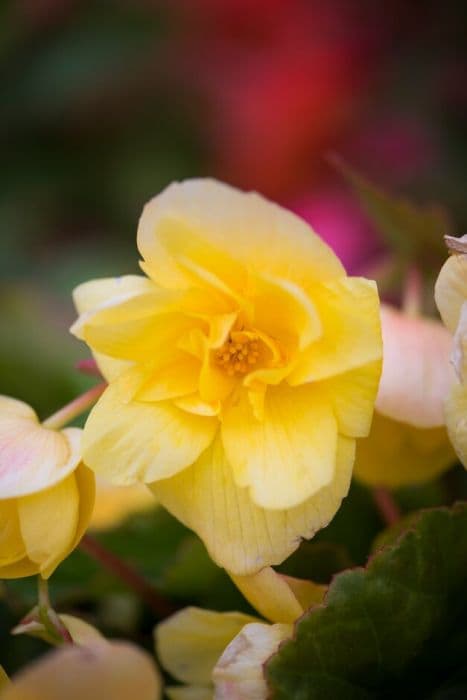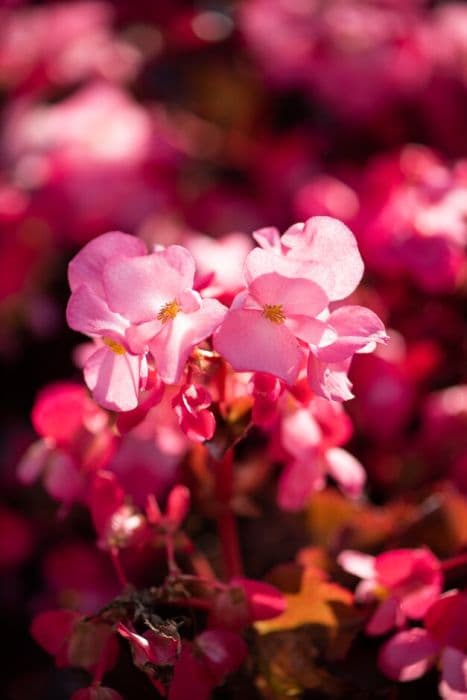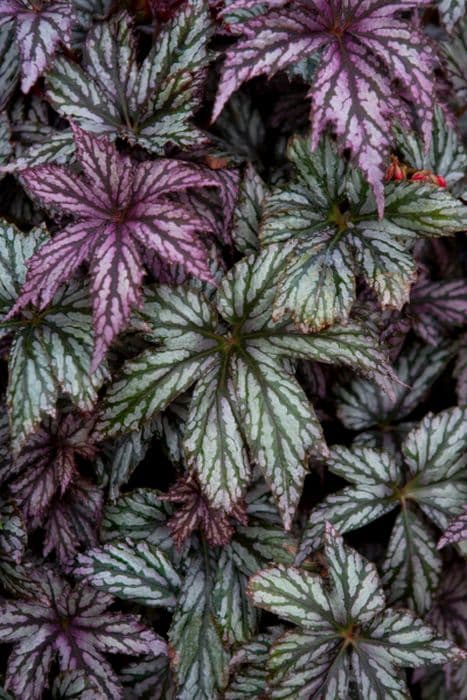Begonia Begonia 'Ikon Blush White' (Ikon Series)

ABOUT
The Begonia 'Ikon Blush White' is a striking plant notable for its lush, green foliage and delicate white flowers that have a blush of soft pink, adding a beautiful contrast to the plant. The leaves are glossy and possess a round to ovate shape with a slightly pointed tip, characterized by their crisp, clean edges and prominent veining, which gives them depth and texture. This begonia variety produces clusters of flowers that rise above the foliage on slender stems, making the blooms a focal point that draws the eye. The flowers are composed of several petals that are slightly ruffled, which adds to their charm and a sense of softness. This plant exudes an elegant and refined look, often making it a favorite for adding a touch of brightness to shaded garden areas or as a feature in indoor plant displays.
About this plant
 Names
NamesFamily
Begoniaceae
Synonyms
Ikon Blush White Begonia, Begonia 'Ikon Blush White'
Common names
Begonia 'Ikon Blush White' (Ikon Series)
 Toxicity
ToxicityTo humans
Begonias, including the Begonia 'Ikon Blush White', contain insoluble oxalates which can be mildly toxic to humans if ingested. If someone eats part of a begonia, they might experience symptoms such as burning and irritation of the mouth, tongue, and lips, along with difficulty swallowing, and a sensation of choking or swelling of the throat, which may lead to gastrointestinal upset like nausea, vomiting, and diarrhea. It is generally advised to keep begonias out of reach from small children who might accidentally consume plant parts.
To pets
Begonias, including the Begonia 'Ikon Blush White', are also toxic to pets due to the insoluble oxalates they contain. If a pet, such as a cat or a dog, ingests any part of these plants, they may show symptoms including oral irritation, excessive drooling, vomiting, and difficulty swallowing. In severe cases, if large amounts are ingested, they might cause kidney failure. Pet owners should ensure that begonias are kept away from their pets to prevent accidental ingestion.
 Characteristics
CharacteristicsLife cycle
Perennials
Foliage type
Evergreen
Color of leaves
Green
Flower color
White
Height
1-1.5 feet (30-45 cm)
Spread
1-1.5 feet (30-45 cm)
Plant type
Herb
Hardiness zones
10
Native area
Tropical regions
Benefits
 General Benefits
General Benefits- Enhances Aesthetics: The Begonia 'Ikon Blush White' adds visual appeal to gardens and indoor spaces with its elegant white blooms and lush green foliage.
- Low Maintenance: This variety of begonia is known for being relatively easy to care for, making it suitable for gardeners of all skill levels.
- Drought Tolerant: Once established, it can tolerate periods of dryness, meaning it doesn't require constant watering.
- Versatile Planting Options: It can be planted in flower beds, containers, and hanging baskets, offering a variety of display options.
- Long Blooming Period: The Begonia 'Ikon Blush White' has a long flowering season, providing continuous color throughout the warmer months.
- Attracts Pollinators: The flowers can attract beneficial pollinators like bees and butterflies to your garden.
- Immediate Impact: As a fast-growing plant, it quickly fills spaces with vibrant foliage and flowers, creating an immediate impact in the garden or home.
- Shade Tolerance: It can grow in a range of light conditions, including shaded areas where many other plants struggle.
 Medical Properties
Medical PropertiesThis plant is not used for medical purposes.
 Air-purifying Qualities
Air-purifying QualitiesThis plant is not specifically known for air purifying qualities.
 Other Uses
Other Uses- As a natural dye: The petals of the Begonia can be used to extract a light pink or white dye for fabric, providing a subtle coloring derived from a natural source.
- Edible decoration: The flowers of the Begonia can be used as an edible garnish in salads and desserts, adding a splash of color and a hint of flavor to dishes.
- Photography subject: With its delicate white flowers and lush foliage, the Begonia can serve as an excellent photography subject for botanical artists and hobbyists.
- Artistic inspiration: Artists can use the Begonia as a model for drawings, paintings, and other artistic endeavors due to its aesthetic appeal.
- Ecosystem support: When planted outdoors, Begonias can provide nectar for pollinators such as bees, butterflies, and hummingbirds, supporting local ecosystems.
- Seasonal crafts: The blooms and leaves of the Begonia can be incorporated into seasonal craft projects, such as wreaths or table centerpieces.
- Learning tool: Botany students can use the Begonia plant to study plant structure, life cycles, and flowering patterns in educational settings.
- Stress relief: Caring for a Begonia plant can be a form of stress relief and therapeutic activity for individuals looking to connect with nature indoors.
- Decorative mulch: Dried Begonia leaves can be used as a natural and decorative mulch for garden beds and potted plants, providing soil insulation and moisture retention.
- Scented sachets: Dried Begonia flowers can be used to make scented sachets, offering a subtle fragrance for drawers and closets.
Interesting Facts
 Feng Shui
Feng ShuiThe Begonia is not used in Feng Shui practice.
 Zodiac Sign Compitability
Zodiac Sign CompitabilityThe Begonia is not used in astrology practice.
 Plant Symbolism
Plant Symbolism- Caution and Warning: Begonias, in general, are often associated with caution or warning, possibly due to their delicate appearance and the fact that some species can be toxic if ingested.
- Harmony: The 'Ikon Blush White' begonia, with its balanced and symmetrical appearance, can be a symbol of harmony and peace.
- Individuality: Each begonia flower is unique, symbolizing individuality and the celebration of personal expression.
- Gratitude: Begonias are given as a gesture of thanks and appreciation, making them a symbol of gratitude and respect.
 Water
WaterThe White Begonia should be watered when the top inch of soil becomes dry, which commonly means once a week depending on environmental conditions. It's important to avoid waterlogging, so provide enough water to moisten the soil without leaving standing water in the pot. A rule of thumb is to use approximately 16 to 24 ounces of water for a medium-sized pot, ensuring even distribution across the soil surface. Reduce watering frequency during winter months when the plant is not actively growing.
 Light
LightWhite Begonias thrive in bright, indirect sunlight. A spot near an east or west-facing window where it can receive gentle morning or evening sun is ideal. Direct midday sun should be avoided as it can scorch the leaves. The plant will also do well under fluorescent or grow lights if natural light is insufficient.
 Temperature
TemperatureWhite Begonias prefer a temperature range between 60 and 75 degrees Fahrenheit to thrive. They should not be exposed to temperatures below 50 degrees Fahrenheit as cold temperatures can damage the plant. Maintaining an even temperature without sudden drafts or fluctuations will help the plant stay healthy.
 Pruning
PruningWhite Begonias benefit from occasional pruning to remove dead or yellowing leaves and to promote a bushier growth habit. It's best to prune in the spring or early summer, cutting back any leggy growth or spent flowers. Pruning every few months will keep the plant looking tidy and encourage more blooms.
 Cleaning
CleaningAs needed
 Soil
SoilBegonia 'Ikon Blush White' thrives in a well-draining soil mix that's rich in organic material, like a blend of peat, pine bark, and perlite. The ideal pH range for this begonia is slightly acidic to neutral, around 5.5 to 6.5. Ensuring proper drainage will help prevent root rot and provide the conditions the Begonia 'Ikon Blush White' needs to flourish.
 Repotting
RepottingBegonias, including the 'Ikon Blush White', should typically be repotted every 1-2 years to refresh the soil and provide room for growth. It's best to repot in the spring or early summer when the plant is entering a period of active growth.
 Humidity & Misting
Humidity & MistingBegonia 'Ikon Blush White' prefers high humidity levels, ideally between 50-70%. It's beneficial to maintain these conditions consistently to keep the plant healthy and encourage robust growth.
 Suitable locations
Suitable locationsIndoor
Place in bright, indirect light with high humidity and good airflow.
Outdoor
Keep in partial shade, shelter from wind, water when topsoil dries.
Hardiness zone
10-11 USDA
 Life cycle
Life cycleThe life cycle of Begonia 'Ikon Blush White' begins with seed germination, where the tiny seeds need warmth, light, and consistent moisture to sprout into seedlings. Once germinated, the seedlings develop into juvenile plants with characteristic heart-shaped leaves and begin a period of vegetative growth, establishing a strong root system and foliage. As the plants mature, they enter the flowering stage, producing the distinctive blush white blooms that may appear throughout the growing season, particularly in mild climates or if grown indoors with adequate light. After flowering, begonias set seeds, completing their reproductive cycle, although Begonia 'Ikon Blush White' is often propagated vegetatively via stem or leaf cuttings for consistent plant characteristics. In temperate regions, begonias generally experience a period of dormancy during the colder months, where they die back to the ground and rest until favorable conditions return in spring. Throughout their life, Begonia 'Ikon Blush White' requires high humidity, moderate temperatures, and well-draining soil to thrive and will continually repeat its perennial cycle if the environmental conditions are maintained.
 Propogation
PropogationPropogation time
Spring-Summer
Propogation: Begonia 'Ikon Blush White', part of the Ikon Series, is best propagated through stem cuttings, as it is both practical and straightforward. The ideal time to do this is in late spring to early summer when the plant is actively growing. To propagate, select a healthy stem with at least a couple of leaves and snip a 4-inch (about 10 cm) section. The cut end should be dipped in rooting hormone powder to encourage root development. Afterward, the cutting should be planted in a pot filled with a mix of peat and perlite or a similar well-draining medium. Keeping the soil consistently moist and providing the cutting with bright, indirect sunlight will foster growth. New roots typically establish within a few weeks, at which point the new begonia can begin to be treated like an established plant.



![Begonia [Bonfire]](/_next/image?url=https%3A%2F%2Fplants-admin.emdemapps.com%2Fimages%2Fplants%2F%2Fimages%2F604b6124363f0.png&w=640&q=75)


![Begonia [Devotion]](/_next/image?url=https%3A%2F%2Fplants-admin.emdemapps.com%2Fimages%2Fplants%2F%2Fimages%2F604b58183573b.png&w=640&q=75)


